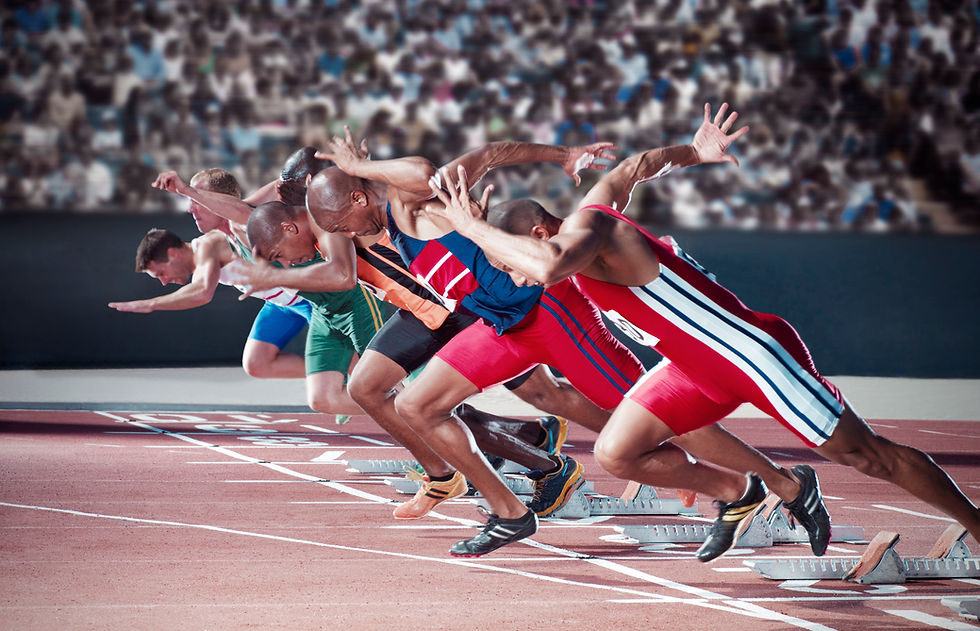Unleashing Athletic Potential: How Physiotherapy Elevates Performance
- physio540
- Mar 14, 2024
- 2 min read
Athletic performance is not only about skill and strength but also about optimizing the body's mechanics and movement patterns. Physiotherapy plays a vital role in enhancing athletic abilities by addressing biomechanical imbalances, preventing injuries, and promoting optimal function. In this blog post, we'll explore how physiotherapists collaborate with athletes to unlock their full potential and achieve peak performance.
Understanding Athletic Performance Enhancement:
Athletic performance encompasses various factors, including strength, speed, agility, endurance, and flexibility. While athletes focus on honing their skills and conditioning, addressing underlying biomechanical issues is equally important for maximizing performance and reducing the risk of injury. Physiotherapy interventions aim to optimize movement patterns, enhance muscle function, and improve overall athletic efficiency.
The Role of Physiotherapy in Performance Optimization:
Physiotherapists are trained to assess movement patterns, identify biomechanical imbalances, and develop targeted interventions to address specific needs. By collaborating closely with athletes, physiotherapists can customize treatment plans to optimize performance and minimize the risk of injury.
Key aspects of physiotherapy in performance enhancement include:
Movement Assessment: Physiotherapists conduct comprehensive movement assessments to identify areas of weakness, imbalance, or dysfunction. This may involve analyzing gait, posture, joint mobility, muscle strength, and flexibility.
Biomechanical Correction: Through manual therapy techniques, corrective exercises, and neuromuscular re-education, physiotherapists address biomechanical issues to optimize movement efficiency and reduce the risk of overuse injuries.
Strength and Conditioning: Physiotherapists design targeted strength and conditioning programs to enhance muscle strength, power, and endurance, tailored to the specific demands of the athlete's sport.
Injury Prevention: By addressing imbalances and weaknesses, physiotherapists help athletes prevent injuries before they occur. Education on proper warm-up, cool-down, and recovery strategies further reduces the risk of injury during training and competition.
Rehabilitation: In the event of an injury, physiotherapists play a crucial role in the rehabilitation process, guiding athletes through targeted exercises, manual therapy, and progressive return-to-sport protocols to restore optimal function and performance.
Practical Applications for Athletes:
Running: Physiotherapists analyze running mechanics, identify inefficiencies, and provide corrective exercises to improve stride length, cadence, and foot placement.
Strength Training: Physiotherapists prescribe strength training exercises targeting specific muscle groups to enhance power, stability, and resilience in athletes.
Sports-Specific Training: Physiotherapists incorporate sports-specific drills and movements into training programs to simulate game scenarios and improve performance under pressure.
Flexibility and Mobility: Through stretching techniques, joint mobilization, and proprioceptive exercises, physiotherapists enhance flexibility and mobility to optimize movement patterns and prevent injuries.
Recovery Strategies: Physiotherapists advise athletes on recovery strategies such as foam rolling, stretching, massage, and cryotherapy to facilitate muscle recovery, reduce soreness, and optimize performance for subsequent training sessions or competitions.
Physiotherapy plays a pivotal role in optimizing athletic performance by addressing biomechanical imbalances, preventing injuries, and promoting optimal function. By partnering with physiotherapists, athletes can unlock their full potential, enhance their competitive edge, and achieve peak performance in their respective sports. Whether aspiring to reach new heights or aiming to maintain performance longevity, incorporating physiotherapy into training regimens can lead to tangible improvements in athletic abilities and overall well-being.




Comments